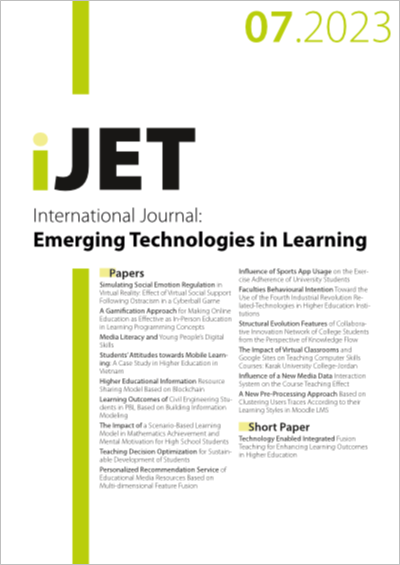A Gamification Approach for Making Online Education as Effective as In-Person Education in Learning Programming Concepts
DOI:
https://doi.org/10.3991/ijet.v18i07.37175Keywords:
gamification, e-learning, programming languages, CAbstract
Gamification is a contemporary concept. It is defined as using game elements such as points and badges in a nongaming environment. This paper takes a profound look at gamification methods in an academic study and comes out with a gamification approach in an attempt to make education more effective. To test the approach described in this research, an experiment was conducted by dividing 46 students in a C++ programming class at a high school into two groups; the first is In-person learning group, in which students learn through the traditional classroom method. The second group is Gamification-based group, for which the researcher designed and built a specific gamification platform by following the guidelines presented in this research study. The results analysis proved that the level of motivation and engagement in the lesson was sufficient. Furthermore, the result of the relationship analysis between variables points and the leaderboard has a strong correlation of r= -0.897 and p<0.01. Another relationship that was analyzed is Points and Concepts attempts. This relationship positively affected student motivation and quality of learning with a moderate correlation of r=0.450 and p<0.05. Regarding the questionnaire analysis results, students preferred the Leaderboard by 60.9 %, Points by 21.7 %, Levels by 13 %, and Badges by 4.3%. As for the interview conducted with teachers specialized in teaching C++, they encouraged the exploitation of the gamification approach in learning programming language concepts, and from their point of view that this approach helps to increase the motivation and engagement of students in the lesson. Further research is needed to improve this approach to learning by designing rules and guidelines to bridge the gap with other gamification approaches.
Downloads
Published
How to Cite
Issue
Section
License
Copyright (c) 2023 Rawan Mustafa Abuhammad, Prof. Dr. Thair Hamtini

This work is licensed under a Creative Commons Attribution 4.0 International License.


